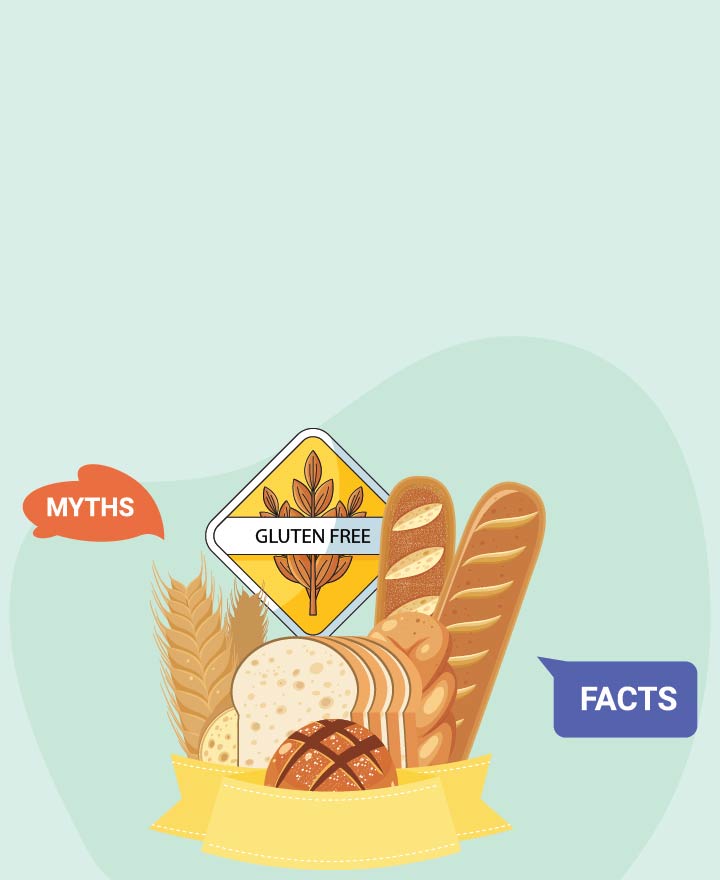

Myths and Facts About Going Gluten-Free
While there are quite a lot of people who are following gluten free diet, there are lot of myths and facts about going gluten free. Read on to know about the various gluten free myths and facts and make your decision based on factual pieces of evidence that are proven by medical professionals.
What is a Gluten Free Diet?
A gluten-free diet is an eating plan that excludes foods containing gluten. Gluten is a protein found in wheat, barley, rye and triticale (a cross between wheat and rye).
A gluten-free diet is essential for managing signs and symptoms of celiac disease and other medical conditions associated with gluten.
Myths Vs Facts
Here are some of the biggest myths and facts around gluten, so you can figure out what’s right for you.● Myth: Gluten intolerance is a uncommon
● Fact:
Several studies have shown that 40 to 50% of the world's population has some level of intolerance to gluten. According to the Colombian Celiac foundation, the number of people with undiagnosed celiac disease is ten times more than the people who have been diagnosed with it.
● Myth: Gluten free diet can significantly reduce body weight
● Fact:
Not necessarily because gluten is used as a stabilizer, a texture modifier, and an emulsifying agency in hundreds of processed foods. On the other hand, if you follow a diet that is naturally gluten free (such as fruit, vegetables, rice, quinoa, or grains), can help with weight loss, as this will improve digestion and reduce inflammation in the body.
● Myth: Gluten-free diet is healthy for everyone
● Fact:
While it is necessary for people with intolerance to gluten or celiac disease, people who are not gluten intolerant do not necessarily need to eliminate it from their diet. This is because many products that contain gluten are important sources of nutrients and not including them in the diet can create a nutritional imbalance.
● Myth: Dietary supplements can heal celiac disease
● Facts:
No. Apart from following a complete gluten-free diet, no other dietary supplements can heal celiac disease.
● Myth: Celiac disease is just another word for wheat allergy
● Fact:
No, celiac disease is not the same as wheat allergy. It is much more serious and permanent than a wheat allergy. While celiac disease is an immune disease that seriously affects the digestive process in the small intestine, wheat allergy is a short-lived reaction and does not have significant effects on the body.
● Myth: Symptoms of gluten intolerance and lactose intolerance are similar
● Fact:
No. In celiac disease, there are oral symptoms such as bad breath, cold sores, and, inflamed gums, intestinal symptoms such as reflux, inflammation, diarrhea, and, constipation, muscular symptoms such as lower back pain, and, swelling joints, skin symptoms such as acne, eczema, reddening scalp, and, allergies, and finally emotional symptoms such as anxiety, depression, not thinking clearly, and, irritability.
● MYTH: Gluten is only found in wheat and its derivatives
● Fact:
No. Gluten is one of the most common additives present in processed foods and can be found in a wide variety of products including sauces, cheeses, preserved foods, and chocolate. It can also be found in cosmetics and medications.
Conclusion
While, following gluten free diet is a necessity for people diagnosed with celiac disease or who are gluten intolerant, it is not necessary for people who aren’t as it can create a nutritional imbalance. The decision of following gluten-free diet must be made after consulting the doctor.
Sources: Webmd, Sanitas, Closing the Gap, Harvard Health
Disclaimer: This blog provides general information and discussions about health and related subjects. The information and other content provided in this blog, website or in any linked materials are not intended and should not be considered, or used as a substitute for, medical advice, diagnosis or treatment. Kindly contact your Doctor before starting a new medicine or health regime.
Related Articles
Ways To Include Protein-Rich Food In Your Diet
13 Best Low-Calorie Foods To Satisfy Your Hunger
Change Diet To Overcome Vitamin B12 Deficiency
Things To Know About Keto Diet
Nutrition Matters - Eat Healthy To Maintain Fitness!
Published on October 15, 2021

















 Health Insurance
Health Insurance  Travel Insurance
Travel Insurance  Car Insurance
Car Insurance  Cyber Insurance
Cyber Insurance  Critical Illness Insurance
Critical Illness Insurance
 Pet Insurance
Pet Insurance
 Bike/Two Wheeler Insurance
Bike/Two Wheeler Insurance  Home Insurance
Home Insurance  Third Party Vehicle Ins.
Third Party Vehicle Ins.  Tractor Insurance
Tractor Insurance  Goods Carrying Vehicle Ins.
Goods Carrying Vehicle Ins.  Passenger Carrying Vehicle Ins.
Passenger Carrying Vehicle Ins.  Compulsory Personal Accident Insurance
Compulsory Personal Accident Insurance  Travel Insurance
Travel Insurance  Rural
Rural